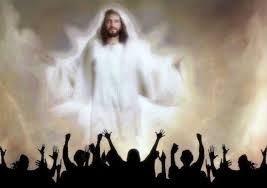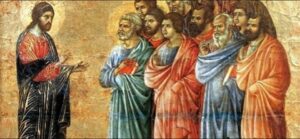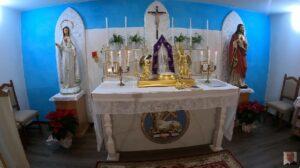
And he said, I believe, Lord. Kneel. And falling down, he worshipped Him.
ORARI S.MESSA DI OGGI MERCOLEDI 30 MARZO 2022, ORE 8.00 – Feria Quarta infra Hebdomadam IV in Quadragesima ~ III. classis
S.MESSA ONLINE DI DON ENRICO RONCAGLIA, su youtube channel:
https://www.youtube.com/channel/UCYYDj4O4e11cE7XNtngkoJA E QUI
LITURGIA IN LATINO\ENGLISH:
https://divinumofficium.com/cgi-bin/missa/missa.pl
COMMUNIO PREGHIERE\PRAYERS:
https://www.proselitismodellascienza.it/2021/10/25/communio-e-comunione-spirituale/
EVANGELIUM E OMELIA\HOMILY:
Evangelium Ioann 9:1-38
In illo témpore: Prætériens Iesus vidit hóminem cæcum a nativitáte: et interrogavérunt eum discípuli eius: Rabbi, quis peccávit, hic aut paréntes eius, ut cæcus nascerétur? Respóndit Iesus: Neque hic peccávit neque paréntes eius: sed ut manifesténtur ópera Dei in illo. Me opórtet operári ópera eius, qui misit me, donec dies est: venit nox, quando nemo potest operári. Quámdiu sum in mundo, lux sum mundi. Hæc cum dixísset, éxspuit in terram, et fecit lutum ex sputo, et linívit lutum super óculos eius, et dixit ei: Vade, lava in natatória Síloe (quod interpretátur Missus). Abiit ergo, et lavit, et venit videns. Itaque vicíni, et qui víderant eum prius, quia mendícus erat, dicébant: Nonne hic est, qui sedébat et mendicábat? Alii dicébant: Quia hic est. Alii autem: Nequáquam, sed símilis est ei. Ille vero dicébat: Quia ego sum. Dicébant ergo ei: Quómodo apérti sunt tibi óculi? Respóndit: Ille homo, qui dícitur Iesus, lutum fecit, et unxit oculos meos, et dixit mihi: Vade ad natatória Síloe, et lava. Et ábii, et lavi, et vídeo. Et dixérunt ei: Ubi est ille? Ait: Néscio. Addúcunt eum ad pharisæos, qui cæcus fúerat. Erat autem sábbatum, quando lutum fecit Iesus, et apéruit óculos eius. Iterum ergo interrogábant eum pharisæi, quómodo vidísset. Ille autem dixit eis: Lutum mihi posuit super oculos, et lavi, et video. Dicébant ergo ex pharisæis quidam: Non est hic homo a Deo, qui sábbatum non custódit. Alii autem dicébant: Quómodo potest homo peccator hæc signa facere ? Et schisma erat inter eos. Dicunt ergo cæco íterum: Tu quid dicis de illo, qui apéruit óculos tuos? Ille autem dixit: Quia Prophéta est. Non credidérunt ergo Iudæi de illo, quia cæcus fuísset et vidísset, donec vocavérunt paréntes eius, qui víderat: et interrogavérunt eos, dicéntes: Hic est fílius vester, quem vos dícitis, quia cæcus natus est? Quómodo ergo nunc videt? Respondérunt eis paréntes eius, et dixérunt: Scimus, quia hic est fílius noster, et quia cæcus natus est: quómodo autem nunc vídeat, nescímus: aut quis eius aperuit oculos, nos nescímus: ipsum interrogáte, ætatem habet, ipse de se loquatur. Hæc dixérunt paréntes eius, quóniam timébant Iudæos: iam enim conspiráverant Iudæi, ut, si quis eum confiterétur esse Christum, extra synagógam fíeret. Proptérea paréntes eius dixérunt: Quia ætatem habet, ipsum interrogáte. Vocavérunt ergo rursum hóminem, qui fúerat cæcus, et dixérunt ei: Da glóriam Deo. Nos scimus, quia hic homo peccátor est. Dixit ergo eis ille: Si peccátor est, néscio: unum scio, quia, cæcus cum essem, modo vídeo. Dixérunt ergo illi: Quid fecit tibi? quómodo apéruit tibi óculos? Respóndit eis: Dixi vobis iam, et audístis: quid íterum vultis audíre? Numquid et vos vultis discípuli eius fíeri? Male dixérunt ergo ei, et dixérunt: Tu discípulus illíus sis: nos autem Móysi discípuli sumus. Nos scimus, quia Moysi locútus est Deus: hunc autem nescímus, unde sit. Respóndit ille homo et dixit eis: In hoc enim mirábile est, quia vos néscitis, unde sit, et apéruit meos óculos: scimus autem, quia peccatóres Deus non audit: sed, si quis Dei cultor est et voluntátem eius facit, hunc exáudit. A sǽculo non est audítum, quia quis apéruit óculos cæci nati. Nisi esset hic a Deo, non póterat fácere quidquam. Respondérunt et dixérunt ei: In peccátis natus es totus, et tu doces nos? Et eiecérunt eum foras. Audívit Iesus, quia eiecérunt eum foras, et cum invenísset eum, dixit ei: Tu credis in Fílium Dei? Respóndit ille et dixit: Quis est, Dómine, ut credam in eum? Et dixit ei Iesus: Et vidísti eum, et qui lóquitur tecum, ipse est. At ille ait: Credo, Dómine. Hic genuflectitur Et prócidens adorávit eum.
Gospel John 9:1-38
At that time, Jesus, passing by, saw a man blind from birth. And His disciples asked Him, Rabbi, who has sinned, this man or his parents, that he should be born blind? Jesus answered, Neither has this man sinned, nor his parents, but the works of God were to be made manifest in him. I must do the works of Him Who sent Me while it is day; night is coming, when no one can work. As long as I am in the world I am the light of the world. When He had said these things, He spat on the ground and made clay with the spittle, and spread the clay over his eyes, and said to him, Go, wash in the pool of Siloe – which is interpreted ‘Sent’. – So he went away, and washed, and returned seeing. The neighbors therefore and they who were wont to see him before as a beggar, began saying, Is not this he who used to sit and beg? Some said, It is he. But others said, By no means, he only resembles him. Yet the man declared, I am he. They therefore said to him, How were your eyes opened? He answered, The man who is called Jesus made clay and anointed my eyes, and said to me, ‘Go to the pool of Siloe and wash.’ And I went and washed, and I see. And they said to him, Where is He? He said, I do not know. They took him who had been blind to the Pharisees. Now it was a Sabbath on which Jesus made the clay and opened his eyes. Again, therefore, the Pharisees asked him how he received his sight. But he said to them, He put clay upon my eyes, and I washed, and I see. Therefore some of the Pharisees said, This man is not from God, for He does not keep the Sabbath. But others said, How can a man who is a sinner work these signs? And there was a division among them. Again therefore they said to the blind man, What you say of Him Who opened your eyes? But he said, He is a prophet. The Jews therefore did not believe of him that he had been blind and had got his sight, until they called the parents of the one who had gained his sight, and questioned them, saying, Is this your son, of whom you say that he was born blind? How then does he now see? His parents answered them and said, We know that this is our son, and that he was born blind; but how he now sees we do not know, or who opened his eyes we ourselves do not know. Ask him; he is of age, let him speak for himself. These things his parents said because they feared the Jews. For already the Jews had agreed that if anyone were to confess Him to be the Christ, he should be put out of the synagogue. This is why his parents said, He is of age; question him. They therefore called a second time the man who had been blind, and said to him, Give glory to God! We ourselves know that this man is a sinner. He therefore said, Whether He is a sinner, I do not know. One thing I do know, that whereas I was blind, now I see. They therefore said to him, What did He do to you? How did He open your eyes? He answered them, I have told you already, and you have heard. why would you hear again? Would you also become His disciples? They heaped abuse on him therefore, and said, You are His disciple, but we are disciples of Moses. We know that God spoke to Moses; but as for this man, we do not know where He is from. In answer the man said to them, Why, herein is the marvel, that you do not know where He is from, and yet He opened my eyes. Now we know that God does not hear sinners; but if anyone is a worshipper of God, and does His will, him He hears. Not from the beginning of the world has it been heard that anyone opened the eyes of a man born blind. If this man were not from God, He could do nothing. They answered and said to him, You were altogether born in sins, and do you teach us? And they turned him out. Jesus heard that they had cast him out, and when He had found him, said to him, Do you believe in the Son of God? He answered and said, Who is He, Lord, that I may believe in Him? And Jesus said to him, You have both seen Him, and He it is Who speaks with you. And he said, I believe, Lord. Kneel. And falling down, he worshipped Him.
.
.
DALL’OMELIA DI (FROM THE HOMILY BY) DON ENRICO RONCAGLIA – ORARI S.MESSA DI OGGI MERCOLEDI 30 MARZO 2022, ORE 8.00

DALL’OMELIA DI DON ENRICO RONCAGLIA (*)
Ezech 36:23-28
Queste cose dice il Signore Dio: «Io darò gloria al mio nome grande, che è disonorato tra le nazioni in mezzo alle quali voi l’avete profanato, e le nazioni sapranno che io sono il Signore, perché avranno allora la prova della mia santità da quanto opererò in vostro favore. Io vi toglierò di mezzo alle genti, vi radunerò da tutte le regioni, vi condurrò alla vostra terra.
Is 1:16-19
Così parla il Signore Iddio: «Lavatevi, purificatevi, togliete dai miei occhi la cattiveria dei vostri pensieri; cessate di fare il male, imparate a fare il bene, cercate la giustizia, soccorrete l’oppresso, proteggete l’orfano, difendete la vedova.
Joann 9:1-38
In quel tempo: Gesù vide passando un uomo cieco dalla nascita, ed i suoi discepoli gli domandarono: «Maestro, chi ha peccato, lui o i suoi genitori, per nascere cieco?». Rispose Gesù: «Né lui né i suoi genitori han peccato ma è cosi perché in lui si manifestino le opere di Dio. Bisogna che io compia le opere di chi mi ha mandato finché è giorno; poi vien la notte, quando nessuno può operare. Finché son nel mondo son la luce del mondo».
E’ il secondo giorno di celebrazione di Padre Hector dalla Colombia che e’ presente con noi.
Abbiamo sentito nella lettura di Ezechiele la profezia dello Spirito Santo nella Pentecoste.
L’epoca che stiamo vivendo e’ di purificazione e di prova. Sara’ una nuova Pentecoste, quella definitiva.
Abbiamo bisogno di rinascere dall’altro.
Anche nella seconda lettura si parla di purificazione. Dobbiamo collaborare con Dio per la purificazione.
Nel Vangelo si parla del miracolo del cieco nato, che Gesu’ guarisce istantaneamente. Questo stesso miracolo avviene con il nostro battesimo.
E’ interessante notare che il cieco riacquista la vista, ma i farisei diventano ciechi, cadendo nella tenebra.
Cerchiamo dunque di ricevere la grazie di Dio!
Sia lodato Gesu’ Cristo! Sempre sia lodato!.
__________________
(*) Questo commento e’ scritto in tempo reale durante l’omelia. Mi scuso per l’eventuale misinterpretazione delle parole di Don Enrico.
FROM THE HOMILY BY DON ENRICO RONCAGLIA (**)
Hezek 36: 23-28 These things says the Lord God: “I will give glory to my great name, which is dishonored among the nations among which you have profaned it, and the nations will know that I am the Lord, for they will then have proof of my holiness. how much I will work in your favor. I will remove you from the peoples, I will gather you from all regions, I will lead you to your land.
Is 1: 16-19 Thus speaks the Lord God: «Wash yourselves, purify yourselves, remove from my eyes the wickedness of your thoughts; stop doing evil, learn to do good, seek justice, help the oppressed, protect the orphan, defend the widow.
Joann 9: 1-38 At that time: Jesus saw passing a man blind from birth, and his disciples asked him: “Master, who has sinned, he or his parents, to be born blind?”. Jesus replied: «Neither he nor his parents sinned, but it is so for the works of God to be manifested in him. I must do the works of him who sent me while it is day; then comes the night, when no one can operate. As long as I am in the world I am the light of the world ».
It is the second day of celebration of Father Hector from Colombia who celebrates with us.
We heard in the reading of Ezekiel the prophecy of the Holy Spirit on Pentecost. The era we are living in is one of purification and testing. It will be a new Pentecost, the definitive one. We need to be reborn from the other.
The second reading also speaks of purification. We must collaborate with God for purification.
The Gospel speaks of the miracle of the man born blind, which Jesus heals instantly. This same miracle happens with our baptism.
It is interesting to note that the blind regain their sight, but the Pharisees become blind, falling into darkness.
So let us try to receive the grace of God!
Praised be Jesus Christ. Always be praised!
__________________
(*) This comment is written in real time during the homily. I apologize for any misinterpretation of Don Enrico’s words.

